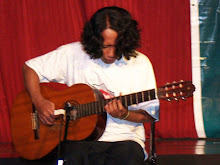.jpg)
Communist Cuba marked the 50th anniversary of its Revolution Thursday faced with an uncertain future, its iconic, ailing leader Fidel Castro withdrawn from power and the economy in dire straits.
President Raul Castro led official ceremonies in Santiago de Cuba, the city from where his brother Fidel proclaimed victory over US-backed dictator Fulgencio Batista in 1959 after 25 months of fighting in the Sierra Maestra mountains.
In an olive green army uniform, Raul, 77, -- who officially took over from 82-year-old Fidel last February -- received an ovation, along with other party leaders, from 3,000 guests at the start of Thursday evening's festivities.
Fidel, who has not appeared in public since undergoing major surgery almost two and a half years ago, sent a brief, signed greeting to the Cuban people in Granma, the communist party newspaper.
But his image dominated giant banners and billboards amid the somber celebrations, with the island hard hit by the economic crisis and the aftermath of three hurricanes this year that left some 10 billion dollars in damage.
"Let's not kid ourselves by believing that from here on, it's all going to be easy. Maybe from here on, it's going to be more difficult," Raul Castro cautioned late Wednesday.
Despite hardships he blamed on 46-year-old US sanctions, the president stressed: "this hasn't been a failure, not even under these conditions. It has been a constant fight."
The celebrations coincide with recent moves by Cuba to broaden its international ties, and the presidents of China and Russia, Hu Jintao and Dmitry Medvedev respectively, sent congratulatory messages Thursday.
Leftist Latin American leaders heaped praise on Cuba's past half-century.
Oil-rich Venezuela, Cuba's main business partner, held a special ceremony to commemorate the anniversary.
Venezuelan President Hugo Chavez called the Cuban Revolution "the mother of all the revolutions going on in Latin America and the Caribbean."
Nicaraguan President Daniel Ortega called the 50th anniversary a "landmark" in Latin American history and Bolivian President Evo Morales lauded the island and its people.
"Fifty years ago the Cuban people freed themselves from US rule. For that, Cuba, its people and its commanders are symbols of the liberation of the people of the world," Morales said.
After years of economic embargo and hardline US efforts to isolate the island, Havana now faces rare potential for change with US president-elect Barack Obama, who has voiced willingness to communicate unconditionally with world leaders.
Cuba's Revolution -- led by a 32-year-old Fidel Castro and legendary Argentine guerilla Ernesto "Che" Guevara -- took on Marxist overtones in May 1961, one month after the attempted invasion of the Bay of Pigs by CIA-backed Cuban exiles.
Former US president John F. Kennedy declared the embargo in February 1962, before the Soviet missile crisis, which took the world to the brink of nuclear war.
The two nations, separated by just 90 miles (145 kilometers) of water, have remained bitter political foes.
A White House spokesman in Texas Wednesday said Washington "will continue to seek freedom" for the people of Cuba.
But Obama, who takes power January 20, has promised to ease some rules limiting travel by and remittances from Cuban-Americans; Raul Castro repeatedly has said he is ready for talks without "carrot or stick" with Obama.
The Cuban president has also promised "structural reforms" -- a departure from his older brother and leading members of the communist old guard.
But the global economic crisis may impact the pledged changes, as the president signaled in July when he announced greater government control of revenues and tighter management of agriculture.
The Caribbean island is still officially in the Special Period in Peacetime, an extended period of economic crisis that began in 1991 after the collapse of its former main benefactor, the Soviet Union.
And life is tough for most of Cuba's 11.2 million people, who earn an average of 20 dollars per month and survive tangled in a parallel economy.
"The Revolution has given us a lot. I'm communist but I wish there were changes in the economy, that's where the problem is," said 65-year-old Pedro at Thursday's celebrations.
"The situation is really bad. Salaries are not enough to live off. They've made a lot of mistakes," said Joel Romero, a 41-year-old who gave up his job as a health worker to rear pigs.
Branded US puppets by Havana, Cuban dissidents say there are 219 "political prisoners" on the island.
During his decades in power, Fidel Castro expropriated foreign companies, jailed political enemies and drove well over a million Cubans into exile.
But he also introduced historic reforms, including major education and health care access advances. (AFP via MSN)




No comments:
Post a Comment